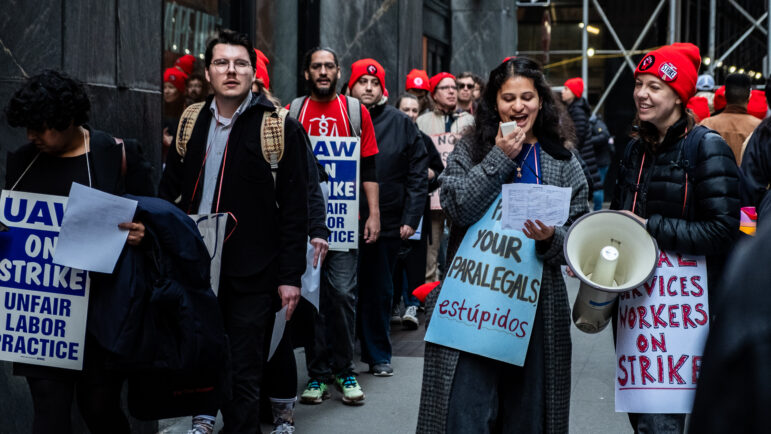Over 100 unionized workers at Mobilization for Justice could return to work as soon as Wednesday morning, members said.

Adi Talwar
Tara Joy, Housing Intake Specialist at Mobilization for Justice, leading chants while picketing in February.Over 100 attorneys, paralegals and support staff with the nonprofit legal services provider Mobilization for Justice (MFJ) are expected to return to work as soon as Wednesday, ending a 13-week strike that secured wins including a $60,000 salary floor for non-lawyers.
A majority of participating union members, 72 percent, voted Monday to ratify management’s latest offer, the union, Legal Services Staff Association Local 2320, said Tuesday.
MFJ’s board of directors will vote on ratification this evening, Chief Development Officer Eric Alterman told City Limits by email, calling the agreement “not quite official yet.” He did not comment on the deal as a whole.
In a statement accompanying the union’s announcement, paralegal and bargaining team member Ella Abeo said workers presented contract demands back in November “aiming to promote racial and economic justice by lifting wages, sustaining healthcare, and improving workplace equity.”
She went on to criticize MFJ for responding with “antagonistic” counter-offers.
“Management pushed us, but we pushed back harder,” Abeo added. “This strike shows that when workers unite, we will win.”
Contours of the contract deal are laid out in a press release on MFJ’s website, published Friday and described then as a memorandum of understanding.
In addition to a $60,000 floor for paralegals and support staff—up from $51,000 and $53,000 respectively—the deal includes salary bumps for early-career lawyers and cost-of-living adjustments of at least 4 percent in the first year, 3 percent in the second year and 3 percent in the third (up from 2 percent annually in an earlier offer).
The agreement also includes a two-day-per-week remote work allowance, according to MFJ’s release, and a one-time bonus of $2,350.
“Since December 2023, MFJ has been actively engaged in good faith negotiations with the LSSA Bargaining Team to reach a fair contract for all staff, focusing on our lowest paid workers, a stated union priority,” the organization wrote Friday.
According to the union, MFJ has also agreed to offer full-time jobs to two temporary workers, including one who was fired after filing a labor grievance seeking such status. Workers previously identified this as a key demand to end the strike.
Union members walked off the job in February, after 93 percent of voting members opted to reject a contract offer they said fell short of their demands, including fair compensation for their lowest-paid colleagues.
At the time, the organization had 42 staff attorneys in its housing practice, helping low-income tenants fight eviction. A smaller number of non-union supervisors and directors have been representing tenants in housing court during the strike.
In addition to housing, MFJ workers specialize in foreclosure, bankruptcy, immigration, government benefits and disability rights.
Last week, Comptroller Brad Lander sent a letter to Department of Social Services Commissioner Molly Park, seeking data to explore how the prolonged strike impacted tenants’ quality of representation in housing court. MFJ participates in the city’s Right to Counsel program, which provides free lawyers to low-income tenants.
The strikers also garnered support from City Council members, including Bronx Councilmember Carmen De La Rosa, who chairs the Committee on Civil Service and Labor. De La Rosa and some of her colleagues said last week that they would encourage an MFJ contracting freeze if the strike did not end by May 22.
Workers’ impending return to work means that their strike will not beat a 15-week industry record in the city, set in 1991.
Tara Joy, a housing intake specialist at MFJ, addressed management at a picket-line rally in Manhattan on May 15, referencing broader support the union garnered during the strike.
“It’s not just our eyes, it’s the eyes of the city on them,” she said.
To reach the reporter behind this story, contact Emma@citylimits.flywheelstaging.com. To reach the editor, contact Jeanmarie@citylimits.flywheelstaging.com
Want to republish this story? Find City Limits’ reprint policy here.








